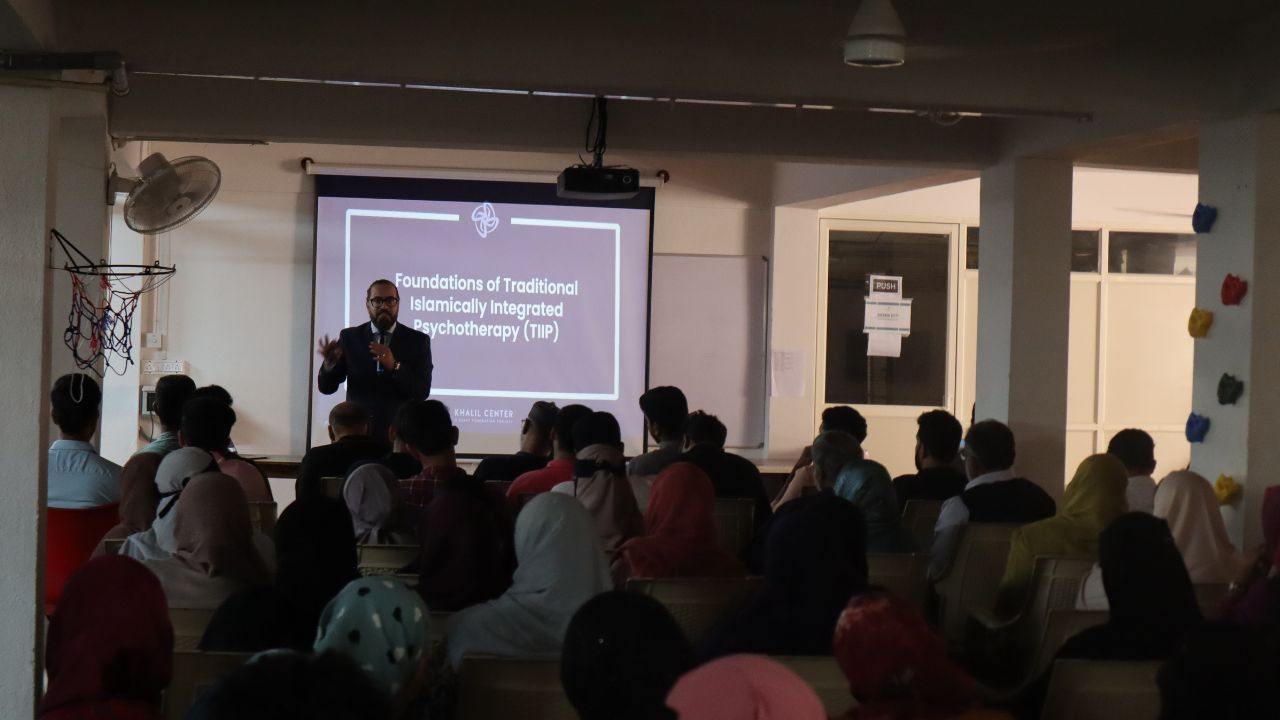Between 31 August and 4 September 2024, Bengaluru welcomed Islamic psychologist Yaqeen Sikander for a transformative five-day event focusing on Traditional Islamically Integrated Psychotherapy (TIIP). Organised by Mind and Brain Hospital in coordination with Khalil Center, and in partnership with the Centre for Study and Research (CSR India) and International Students of Islamic Psychology (ISIP), the event aimed to introduce the Islamic therapeutic framework of TIIP to Muslim mental health professionals in India.
TIIP, developed by Khalil Center’s interdisciplinary team of Islamic scholars and psychologists, integrates contemporary behavioural science within an Islamic epistemological framework. Originally conceptualised by Dr. Hooman Keshavarzi and Dr. Amber Haque in 2013, the model has been further developed by Khalil Centre’s team, including Dr. Fahad Khan and Dr. Khalid Elzamzamy. This APA-approved, evidence-based approach is tailored to meet the needs of Muslim patients and has been continuously refined through ongoing research.

Yaqeen Sikander, a clinical psychologist and certified TIIP practitioner based in Istanbul, Turkey, led the sessions. Currently pursuing a doctorate in Clinical Psychology at Ibn Haldun University in Istanbul, Sikander has completed his specialised TIIP training under Dr. Keshavarzi. His sessions in Bengaluru offered valuable insights into merging spirituality with modern clinical practice, a core aspect of TIIP.
The event commenced with a Meet and Greet session at Shifaa Hospital, Bengaluru, where Yaqeen Sikander shared his journey through global education and his career in psychology. This session also featured presentations from Dr. Asfiya Khaleel, Psychiatrist and Director of Ummeed Deaddiction and Rehab Centre, Bengaluru, and Dr. Fiaz Ahmed Sattar, one of the leading psychiatrists in Bengaluru. Both provided their insights from years of experience, enriching the discussion on integrating holistic approaches in clinical practice. Zulekha Shakoor Rajani, co-head of the Islamic Psychology department at Mind and Brain Hospital, presented on the evolution of Islamic psychology globally and in India, exploring its development and future prospects. In June 2024, Zulekha Shakoor Rajani and Shujauddin Fahad Inamdar had travelled to Istanbul, Turkey, to undergo TIIP training organised by Khalil Centre. Zulekha completed her TIIP Level 2 training, while Shujauddin completed his TIIP Level 1 training.
“Attending the TIIP training in Istanbul was a transformative experience that deepened my understanding of the vital connection between Islamic principles and modern psychological practices,” said Zulekha Shakoor Rajani, co-organiser of the workshop. “It became clear to me that Muslim mental health professionals in India needed access to this invaluable approach. By introducing TIIP in India, we aimed to introduce Islamic psychology to a broader community of psychologists, therapists, and counsellors, helping them integrate spirituality with their clinical practice. The workshop was a huge success, offering participants practical tools and insights that will enhance their ability to provide holistic, culturally relevant care. I am confident this is just the beginning of a much-needed shift in the way mental health is approached in our community.”

Following the introduction to TIIP, attendees participated in a workshop at Mind and Brain Hospital, focusing on Mastering Therapeutic Excellence. This session covered holistic case conceptualisation, integrative therapeutic interventions, and fostering self-efficacy to enhance client outcomes. On the fourth day, at Ummeed Deaddiction and Rehab Centre, Bengaluru, Sikander provided an introduction to Islamic psychology, discussing its core principles and the role of the practitioner in integrating spirituality into therapy.
The event concluded with a Tafakkur session — a short spiritual retreat emphasising psycho-spiritual contemplation. This session, led by Yaqeen Sikander and Shujauddin Fahad Inamdar, offered participants a unique experience of Islamic meditation and holistic healing.
The success of the workshop highlights the growing interest in Islamic psychology within India. However, co-head of the Islamic Psychology department, Shujauddin Fahad Inamdar, believes there is still much work to be done.
“The growing interest in Islamic psychology in India is both inspiring and encouraging. However, there is still a long way to go in terms of its widespread acceptance among practitioners. We need to focus on developing indigenous psychology that reflects the unique experiences and cultural practices of Indian Muslims. By doing so, we can ensure that mental health care is not only effective but also deeply rooted in the values and traditions of the communities it serves,” said Inamdar.
“The success of this TIIP workshop has exceeded our expectations,” said Dr. Safiya MS, Psychiatrist and Director of Mind and Brain Hospital, the organiser of the event. “The response from mental health professionals across the country has been overwhelmingly positive, reflecting a clear demand for approaches that integrate Islamic principles with psychological care. We believe this workshop will serve as a catalyst for the wider acceptance and practice of Islamic psychology in India. It is our hope that this initiative will inspire more professionals to explore and implement holistic, faith-based mental health practices, ultimately benefiting both practitioners and patients alike.”

Mind and Brain Hospital, a leading neuropsychiatric treatment facility in Bengaluru, hosted this significant event. In 2023, the hospital established India’s first Islamic Psychology department, co-headed by Zulekha Shakoor Rajani and Shujauddin Fahad Inamdar. The department is dedicated to advancing mental health treatments that integrate modern psychological practices with Islamic principles.
Related








































